Embarking on significant production expansion: T&BB interviews Hexagon Purus about the company’s 5-year expansion plan
By Luke Willetts - 26th November 2024
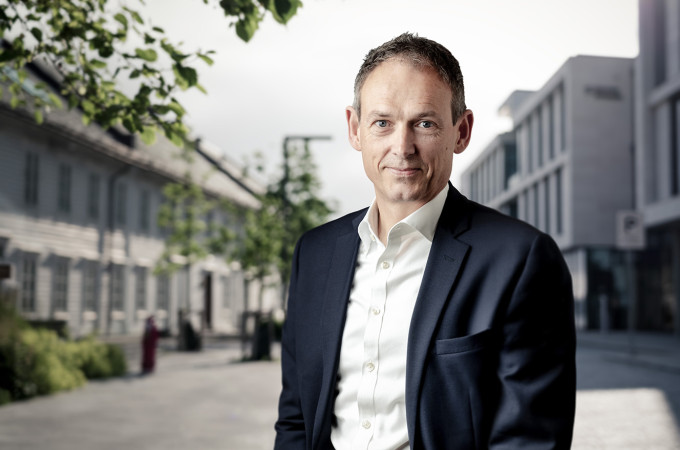
Morten Holum, the President and CEO of Hexagon Purus
Germany / Norway— In September, at the 2024 IAA Transportation event in Hanover, Truck & Bus Builder (T&BB) met with senior management at Hexagon Purus ASA of Oslo, Norway, to discuss the company’s manufacturing investments, new supply agreements and the Tern project. T&BB interviewed Morten Holum, the President and CEO and Dr Michael Kleschinski, EVP of Hydrogen Mobility and Infrastructure at Hexagon Purus and discussed the company’s market positioning as it looks to capitalise on the growing demand for clean transportation technologies needed to drive zero-emission transportation in the Commercial Vehicle (CV) industry.
Spinning off from the Hexagon Group
The Hexagon Group has been in the field of alternative fuel systems for mobility (primarily in natural gas) for decades. Most of the initial development of hydrogen and the battery electric platform happened when Hexagon Purus was part of Hexagon Composites ASA. Holum told us that back in 2019, the executive management team took a strategic look at what the company needed in terms of capital to scale up the business. The decision was made to spin off the company to seek the necessary capital for its growth in late 2020. The spin-off was structured so that the Hexagon Group retained majority ownership in Hexagon Purus. This allowed both companies to position themselves better to capitalise on their respective market opportunities in the clean energy and transportation sectors.
Hexagon Purus now focuses exclusively on developing clean energy solutions in hydrogen storage and distribution, battery systems, and electric vehicle (EV) components. The company manufactures high-pressure Type 4 composite cylinders which are used in hydrogen-powered heavy-duty trucks, buses, off road vehicles, like snow groomers, rail, marine and even aerospace. In addition to hydrogen systems, Hexagon Purus also produces complete battery packs and electric drivetrain solutions for trucks and complete vehicle integration. Solutions aim to enable the transition to zero-emission mobility, making them a key player in the hydrogen and electric vehicle markets.
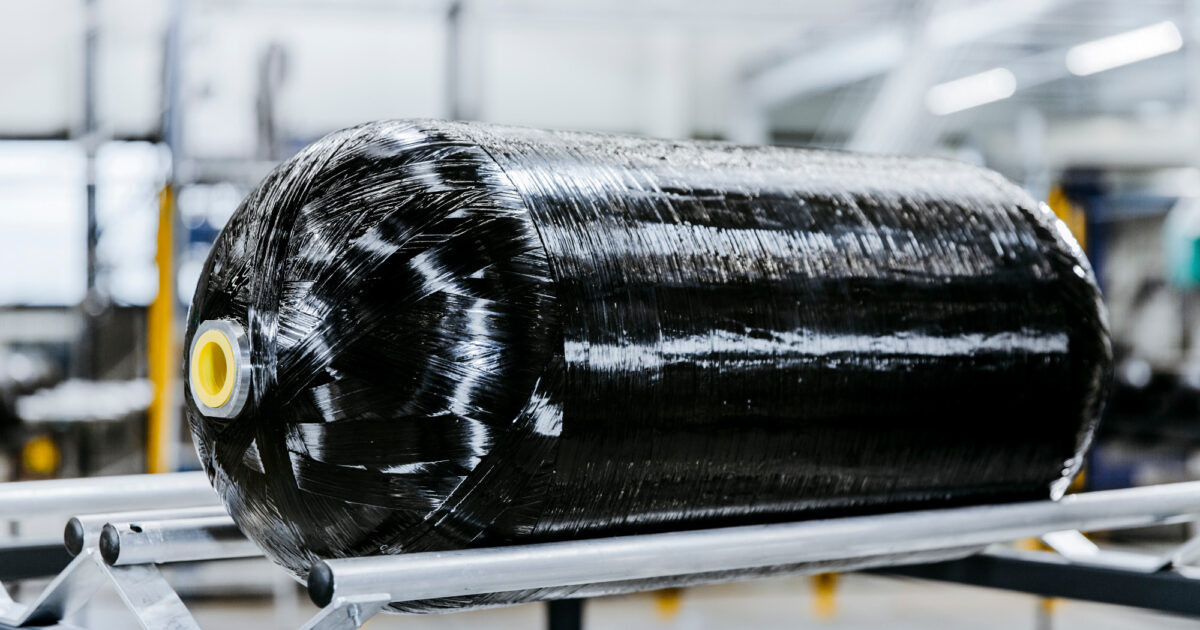
Type 4 hydrogen storage tanks
5-year plan
Holum explained that the company adopted a 5-year plan to scale the business in 2020. The first step involved developing transport solutions for industrial gas companies that haul bulk hydrogen. Following that, the company focused on developing products for its mobility business (hydrogen trucks and battery-electric trucks). Holum admits that the hydrogen bus segment is mostly driving this growth. This is particularly strong in North America and Europe, where hydrogen fuel storage tanks are supplied to the likes of GILLIG, New Flyer Industries, Solaris and Caetano. The first couple of years were spent validating products with customers through trials, increasing the competitiveness of its products. Once the demand increased, the company then went on an investment programme to increase capacity.
Holum said that over the last 18 months, the company has opened seven new manufacturing facilities on three different continents! With this industrial expansion, Hexagon Purus believes it can now supply the volumes that it expects over the next couple of years.
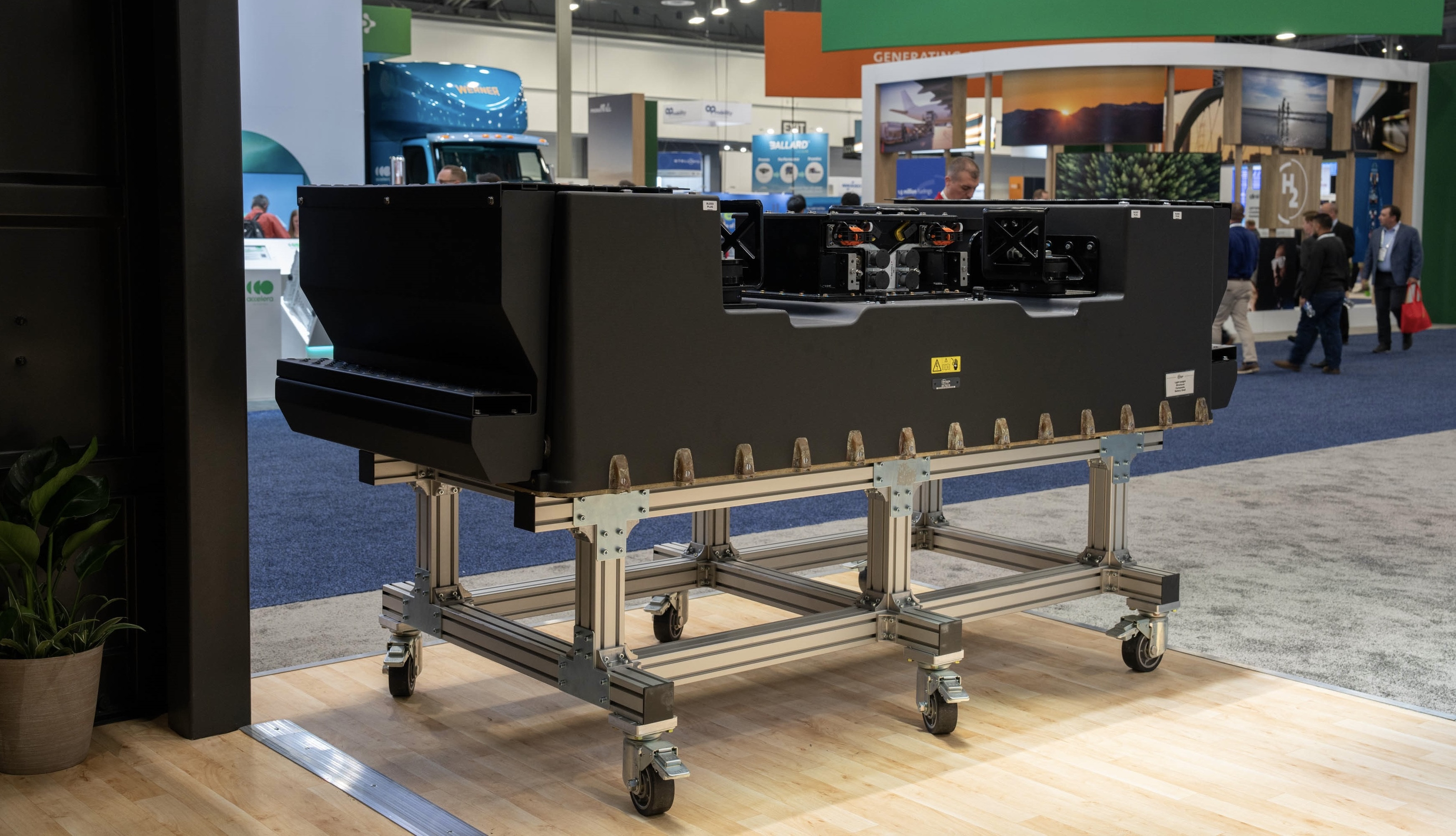
Battery Pack from Hexagon Purus
Investment into manufacturing
Currently, there are several global manufacturing hubs across Germany, Norway, China, Canada, and the U.S. with the Westminster (USA), and Kassel (Germany) facilities focusing on the production of hydrogen cylinders. As aforementioned, the company has made a concerted effort to expand its production by increasing investment in its production facilities. This was in part, funded by the EUR 89 million secured from strategic investors including Mitsui, Hy24, and Hexagon Composites to expand production.
Hydrogen Business
Part of the capital is being ploughed into expanding its hydrogen infrastructure and systems factory in Weeze, Germany. Hexagon Purus has doubled production capacity to meet rising demand for its hydrogen infrastructure products including systems for distribution, refuelling and stationary storage. The existing 11,000m2 state of the art facility in Weeze is now expanded to 16,000m2 and opened in January of this year.
Furthermore, in January 2023 Hexagon Purus opened a new 60,000-square-foot hydrogen cylinder manufacturing facility in Westminster, Maryland, USA. The facility has the capacity to produce up to 10,000 hydrogen Type 4 composite cylinders (per year) used by heavy-duty vehicles. The company relocated its former Maryland production facility based in Taneytown, which was in operation since 2003 with an annual production capacity of 1,200 cylinders. These products will service the North American market, with clients such as Nikola, New Flyer, and aerospace customers, according to Kleschinski.
Commenting on the strategic thinking behind the expansion, Holum, said:
We have been capacity constrained for some time, so we’re happy that we can now meet customer demand and that we’re starting to see the positive impact of higher capacity on our revenue and profitability. We have a large market for hydrogen used in industries such as pharmaceuticals, semiconductors and food. That hydrogen needs to be transported from source to site, and our distribution modules are significantly more cost-efficient than existing distribution solutions. We’re also seeing growth in the mobility part of our business with deliveries to Nikola and transit bus OEMs.
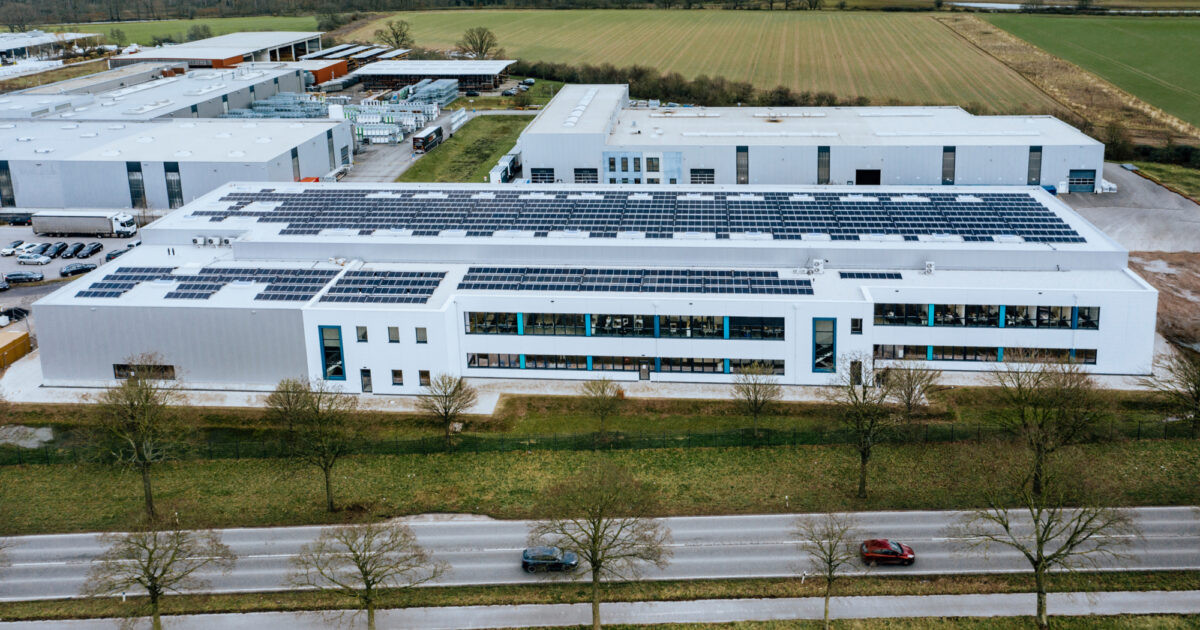
Hexagon Purus factory in Weeze, Germany
Battery Business
Moving stateside, the company embarked on plans to open a new 200,000-square-foot vehicle integration facility in Dallas, Texas, to meet the rising demand from North American OEMs, including Hino. The centrally located facility supports complete vehicle integration of BEV heavy-duty trucks for the North American market. Hexagon Purus signed a 10-year lease agreement for the building, with series production of the Tern RC8 starting at the end of 2024 (more on that below).
The battery systems for the North American market are produced and shipped from Kelowna, British Columbia, Canada. Hexagon Purus said that the 60,000-square-foot facility has an annual production capacity exceeding 1,000 battery systems. The NMC cells are supplied by Panasonic. Interestingly, Holum told us that the site was picked in large part due to the competence in Kelowna, as Western Star Trucks manufactured vehicles there up until 2002.
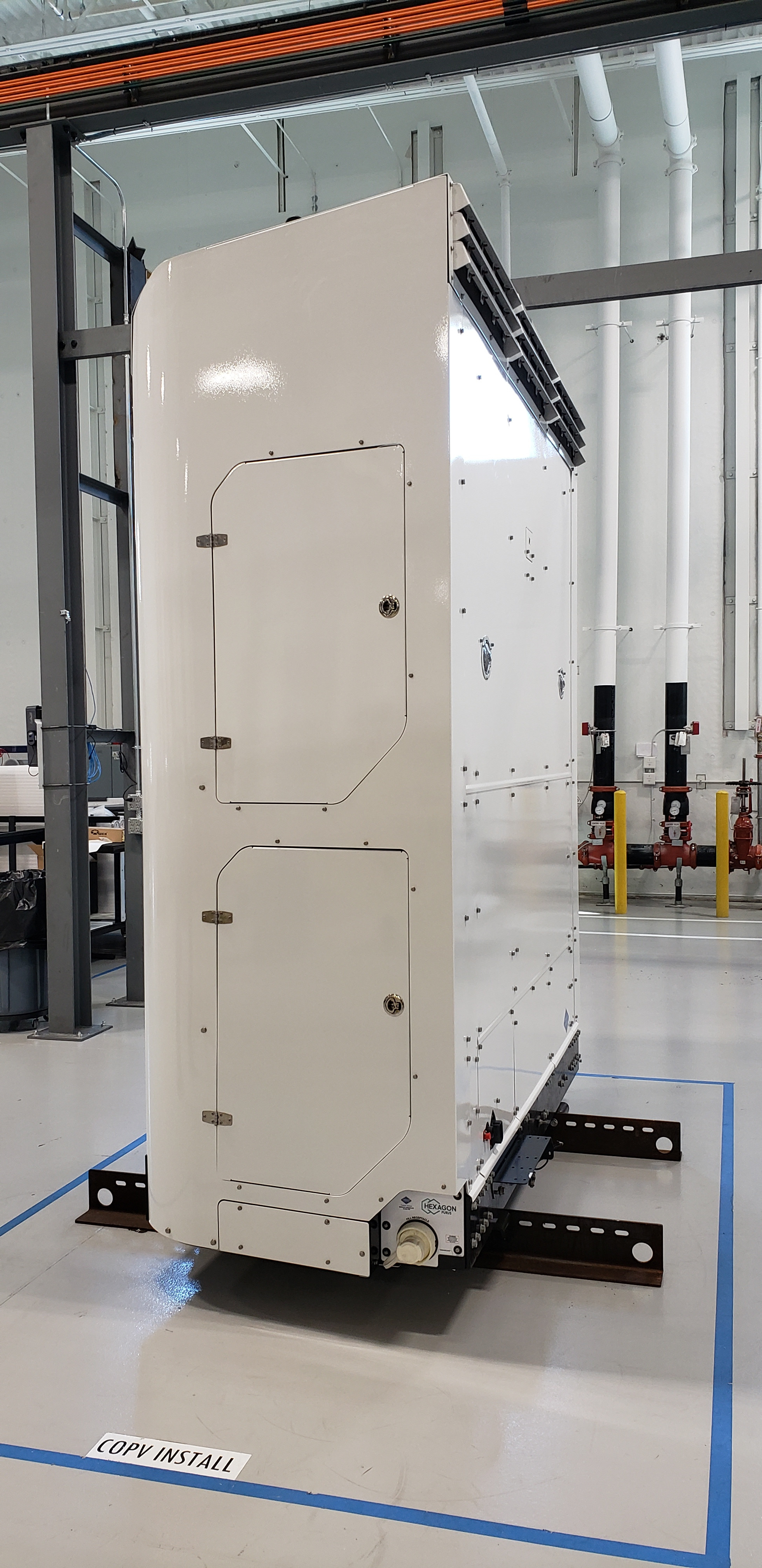
Hexagon Purus hydrogen storage system for Toyota heavy-duty fuel cell electric powertrain kit
Supply agreements
Holum explained that the manufacturing investment has been down to growing market demand. Capital accrued from long term supply agreements have been ploughed back into the company. As aforementioned, in Europe Hexagon Purus has long-term supply agreements with Solaris and Caetano. In North America, the company was selected to supply hydrogen cylinders to Canadian bus builder New Flyer Industries, for use in its Xcelsior CHARGE H2 fuel cell transit bus. Hexagon’s Type 4 hydrogen cylinders store hydrogen at 350 bar and are designed specifically for use in buses. Staying in North America, the company also supplies American heavy-duty transit bus manufacturer Gillig for its new fuel cell-powered transit buses. These hydrogen storage tanks are all produced at the Hexagon Purus facility in Westminster, Maryland.
The company is also supplying hydrogen storage and battery packs to Toyota Motor North America (TMNA) (a subsidiary of Japanese automotive manufacturer, Toyota Motor Corporation) for the series production of its heavy-duty fuel cell electric powertrain kits. The high-voltage battery packs supplied have a 693V max system voltage with a maximum installed capacity of 247 kWh and a typical usable capacity of 218 kWh. These agreements will eventually help decarbonise the American public transport sector.
The fuel cell kit, including the battery and hydrogen storage systems supplied by Hexagon Purus, will be sold to heavy-duty truck OEMs for hydrogen-powered heavy-duty fuel cell electric Class 8 trucks. Paccar, through its subsidiaries Peterbilt and Kenworth, will be using these kits as opposed to developing them in-house.

NFI's Xcelsior CNG bus
Tern
We got the thoughts of Holum on the new EV truck brand Tern, developed by Hexagon Purus in partnership with Hino Motors. At the 2024 Advanced Clean Transportation (ACT) show in Las Vegas, the brand debuted its first production model, the class 8 battery-electric RC8 truck. The truck is built on the proven Hino XL Series 4x2 chassis and equipped with a proprietary battery system, auxiliary modules and power modules by Hexagon Purus. Powered by a 680 peak horsepower electric motor (494 continuous) the truck is fitted with a 538 kWh battery pack (lithium-ion), which provides a range of approximately 200 miles (321 kms) on a single charge. Fast charging capabilities allow the vehicle to charge up to 80% in two hours. The Tern RC8 also features an e-Axle from Dana ensuring optimal power distribution. Holum confirmed that a few hundred trucks are expected to be produced in 2025 as the company scales up production.
The semi-tractor unit is suited for urban goods delivery due to its compact design, short wheelbase and manoeuvrability it affords. The vehicle is set to go into production in Q4 2024, at Hexagon’s new 200,000-square-foot vehicle integration facility in Dallas, Texas with deliveries to customers starting in 2025. Initially set to be released in the U.S. market, the 68,000 lbs (30 tonnes GVW) truck will be distributed through Hino’s dealer network in the United States, which will also be responsible for providing maintenance and aftermarket services. They foresee the delivery of up to 10,000 units by 2030, currently valued at around USD2bn.
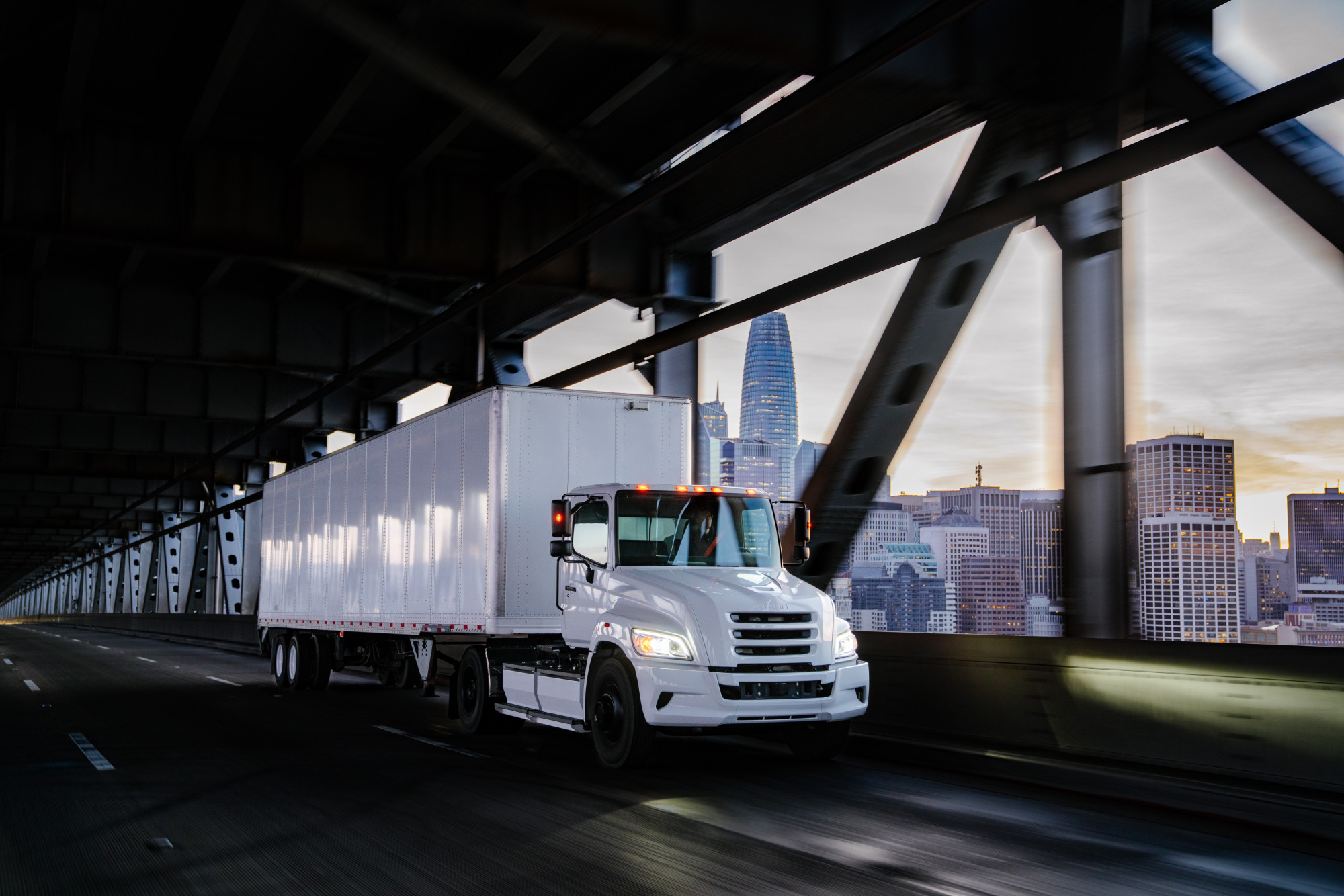
Tern class 8 battery-electric RC8 truck
Other Projects
Late last year, Hexagon Purus announced it would supply Ford Trucks with a complete hydrogen fuel storage system for the development of a fuel-cell electric-powered truck (F-Max FCEV) prototype. As a partner in the Horizon Europe project ZEFES* (Zero Emission Freight EcoSystem), designed to target the decarbonisation of long-haul heavy-duty trucking in Europe, Ford Trucks will develop and deliver a fuel cell electric heavy-duty prototype, which will operate as part of a larger fleet of zero-emission trucks collecting data from around Europe. Developed and manufactured in Turkey, the F-Max FCEV will be Ford Trucks’ first fuel cell-powered vehicle and will begin European demonstrations in 2025.
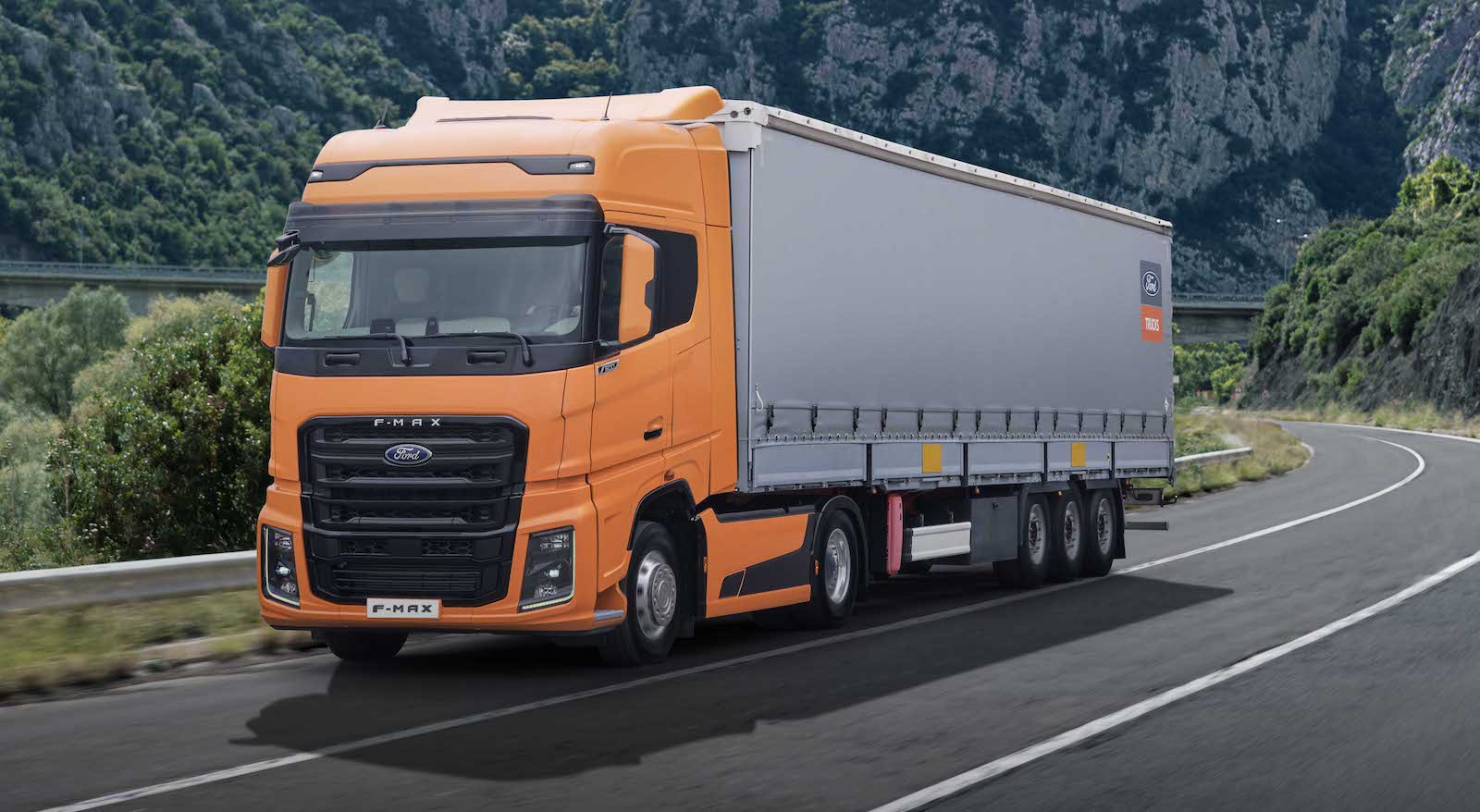
Ford Trucks F-Max FCEV
As a part of Horizon Europe, the EU’s key funding programme for research and innovation to tackle its environmental challenges, project ZEFES aims specifically at addressing the decarbonisation of long-haul heavy-duty freight across Europe. In 2025, the project is set to deploy a total of nine different long-haul truck configurations split into six battery-electric and three fuel-cell electric trucks. The nine trucks will operate for 15 months and collect up to one million kilometres of driving data. With 40 partners from 14 countries and a total investment of EUR 35.5 million, project ZEFES aims to bring various stakeholders in the road transport industry together, in an attempt to meet the EU’s Green Deal emissions targets.
Talking about the project, Kleschinski said:
We are using our in-depth knowledge of lightweight, reliable and safe hydrogen storage technology to help Ford Trucks pave the way for fuel-cell electric long-haul heavy-duty trucking in Europe. We are excited to be selected by Ford Trucks to support their development plan as part of project ZEFES.
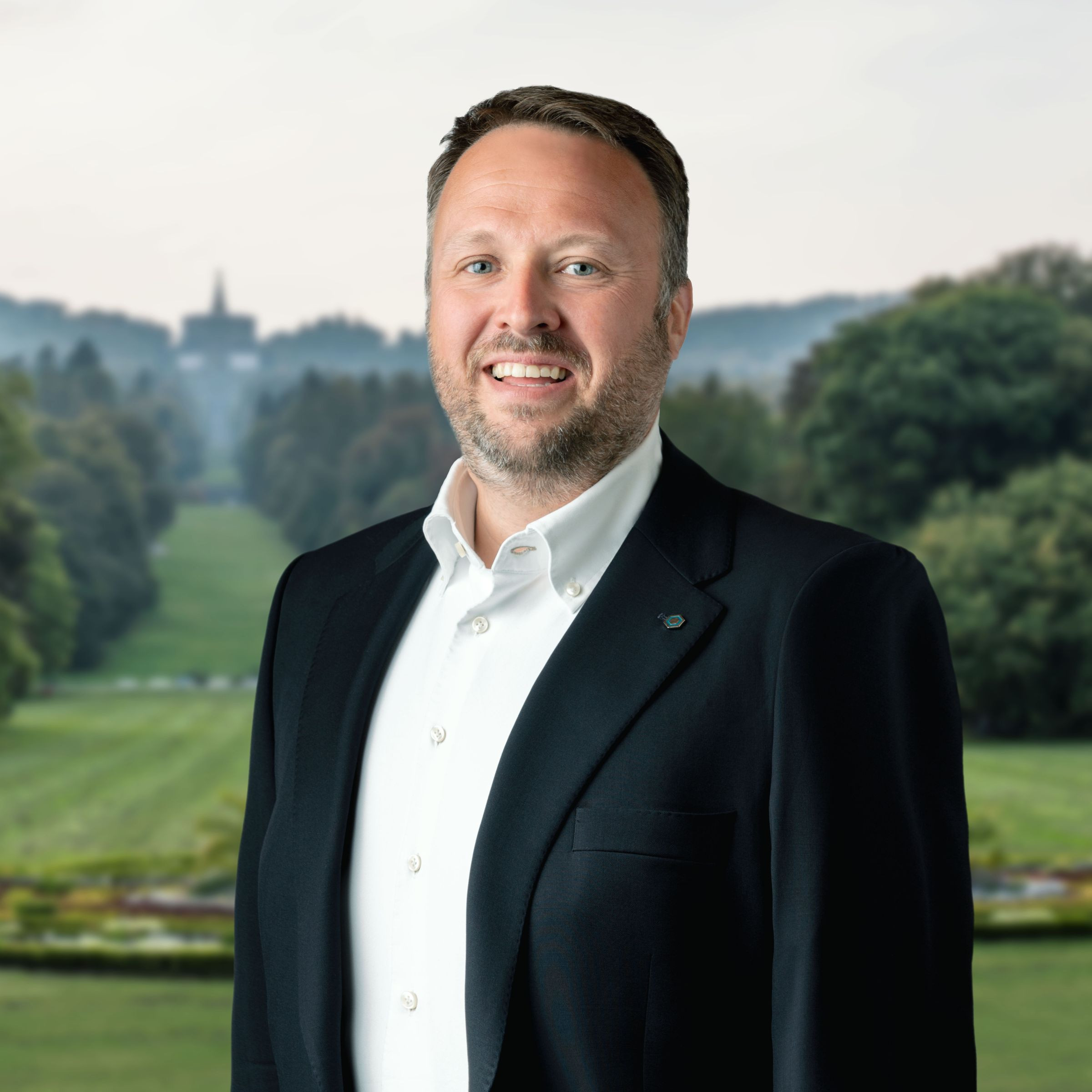
Dr Michael Kleschinski, EVP of Hydrogen Mobility and Infrastructure at Hexagon Purus
*ZEFES is a pan-European project designed to target the decarbonisation of long-haul heavy-duty trucking in Europe, with Ford Trucks supporting the initiative by deploying and delivering its prototype truck, which will operate as part of a large fleet of zero-emission trucks collecting data.
The year ahead
Holum explained that a good 2025 means getting a few hundred of these Tern trucks out the door, ramping up production whilst making sure the customers are happy with the quality of the product. In the hydrogen business, the company has reached positive operating earnings (i.e. EBITDA positive). Based on preliminary estimates, the company expects revenue growth of at least 50% year-over-year for 2025. Hexagon Purus will continue scaling up manufacturing capacity to deliver on existing customer contracts for hydrogen infrastructure and battery systems. These plans indicate that Hexagon Purus is positioning itself for significant growth in 2025, focusing on expanding its capacity, improving profitability, and capitalising on the growing demand for hydrogen and zero-emission mobility solutions.
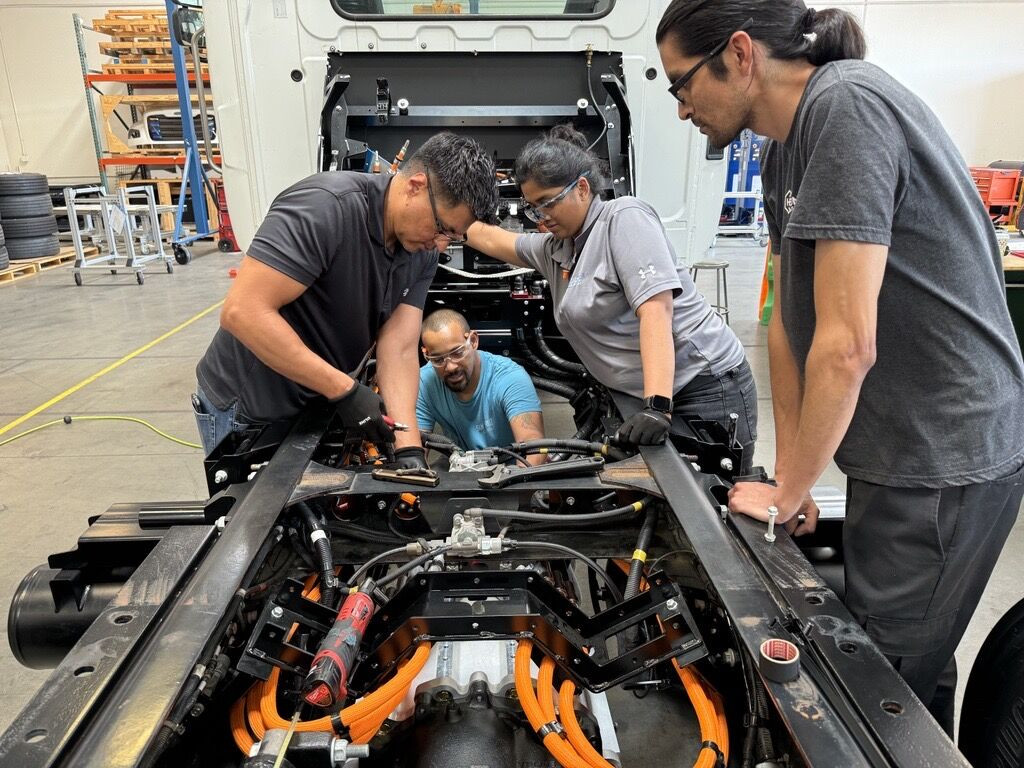
Inside the Dallas facility, gearing up for series production of the RC8 Tern truck


